The Ultimate New Zealand Soccer Website | home
2003 | 2007 | Life As A Professional | Tales Of A Globetrotting Kiwi Soccer Star | Football Family Smith | Pro On The Go | In Action Around The World | Ferns Stats | Bowing Out A Winner
Life As A Professional
A Professional Life, A Professional Outlook
by Jeremy Ruane
New Zealand, as we know, boasts a growing number of professional footballers plying their trade in the game's ultimate hotbed, Europe. And it goes without saying the most celebrated of them all is All Whites captain, Ryan Nelsen.
There is another New Zealand national team captain based in Europe, however, and right now, she's this country's only full-time professional female footballer.
Rebecca Smith is living the dream of many of her country-men and women, in that she's being paid to play the game she loves. But there's another reason she's sporting an ear-to-ear smile on her face at present, for, come the end of September, she'll have led her country through a World Cup Finals campaign, something she is looking forward to immensely.
It'll be a special experience for her should the Women's World Cup draw pit New Zealand against the likes of Germany, Sweden and the USA in China, as it will see Rebecca taking on, on the ultimate stage of all, friends and familiar faces whom she has come across in the near three years she has been living and working in Europe.
So who better than Bex herself to take us on a tour of life as a professional women's footballer, and the prospects for the New Zealand women's team …
GERMANY
I played for a couple of clubs - the Palos Verdes Breakers and Fram - in my junior days before switching to Ajax Southern California, now Ajax America, for whom Simone Carmichael now plays - she and I were team-mates there. While at Ajax, I was also studying at and playing for Duke University - I was there for four years, majoring in Economics and Spanish, and captained the team in my senior year.
I worked full-time in Santa Monica, Los Angeles, for six months after graduation, but when I was told of New Zealand's improved chance to qualify for a World Cup with Australia's likely move from Oceania, I opted to quit my job and try out for some teams in Europe to see if I could contract a professional career there.
This took me through to mid-2004, at which point I secured a six-month contract with German champions FFC Frankfurt. That was an awesome experience, playing alongside and learning from so many good players, such as Renate Lingor, Steffi Jones - who has just announced her retirement from the German national team, and three-time FIFA Women's Player of the Year, Birgit Prinz, who is a great friend.
I also got to know Doris Fitschen, who was the first great star of German women's football and currently works at the German Football Association (DFB). Like me, she played in central defence, but injury had forced her premature retirement. I learned quite a bit about mentality and how it was for her to be the captain of the best team in the world for so many years.
Just being in that environment was so broadening for me. It was so tough professionally, and I felt I had been thrown into the deep end in terms of not only the soccer, but the culture, the language and the lifestyle also.
I really had to dig deep and prove myself each day, especially in the first few weeks. I didn't know German, nor they English, so communicating on and off the field was difficult.
In January 2005, I switched clubs to FFC's cross-town rivals, FSV Frankfurt, who have now phased out the women's side of the club to concentrate on the men's game. Indeed, some of the FFC players went there from FSV.
FSV had the history, but FFC proved excellent in attracting players and sponsors, and have gained the rewards for doing so. Among their principle honours, they were the inaugural UEFA Women's Cup winners in 2002, were runners-up in the 2004 final - I joined them after that game - and they won it again last season.
I spent six months at FSV as well, and came across one of the best coaches I've ever met in my career, Frank Fahle. He was outstanding - I learnt a great deal from him, even though he spoke virtually no English, while I came across some top players while in the Bundesliga, especially given Germany's world champions status.
Birgit, of course, is a stand-out, but so is Connie Pohlers, a smart player who can run for days! She played for the UEFA Women's Cup-winning Turbine Potsdam combination during this time.
SUNNANA
In January, 2005, I was offered a trial by Sunnana SK, but turned them down at the time in order to finish the 2004-5 Frauen Bundesliga season at FSV. Midway through the year, however, I took up their initial offer, and moved to Sweden.
Sunnana SK is based in a place called Skelleftea in Sweden's north-east, over eight hundred kilometres north of Stockholm - the equivalent distance in New Zealand would be that between Auckland and Ashburton.
The Swedish women's league, known as the Damallsvenskan, is the world's best women's competition - it's ahead of the game, even that of Germany. It's played in two parts over the course of the year, with a mid-year break for the summer months. The season finishes in November, which is around the time winter kicks in, and boy, does it kick in!!
It gets so cold! Temperatures rarely get out of the negatives during winter, and often descend into double-digit negatives … even now, just after we've started the 2007 season in mid-April, the range is from 15C to just below zero! Little wonder I always look forward to our family get-togethers in New Zealand over Christmas!!
I've just commenced my third season at Sunnana, having played the second half of the 2005 campaign, and the whole of the 2006 season. And so far, it's been an unbelievable experience!
I've improved season by season, and one of the reasons for that is my central defensive partnership with one of the world's best in the role, Swedish international Hanna Marklund.
She has played over one hundred games for her country - she's the only Sunnana player in the senior Swedish squad at present (we have three U-20s and three U-19 internationals as well), and she's one of the main reasons I joined the club. I've learnt so much from playing alongside her, and now she's a good friend.
She's so good that she's enabled me to get forward and start scoring goals! Just three last year, with the most memorable by far coming in the final game of the 2006 season, against Djurgarden, the second place-getters. We were 2-0 up, but they drew level, then I got the winner with ten minutes to go!!
A number of the world's leading players play for Damallsvenskan clubs, and Umea tend to attract the very best, e.g. Ma Xiaoxu, the new star of Chinese women's soccer, is playing for them until mid-August.
Another of Umea's stars is Marta, from Brazil - she's crazy! Lisa Klaverness from Norway also. But there are several outstanding players sprinkled throughout the league, such as Finnish midfielder Jessica Julin, and a couple of outstanding Swedish internationals.
Lotta Schelin - if she gets the ball, she's gone! She's really fast and plays for Gothenburg, while Djurgarden's Victoria Svensson, Sweden's most capped international, is one of the most competitive players I've played against, a very smart player.
I've been very fortunate in securing these playing opportunities in Germany and Sweden. Among my discoveries is that if you're going to play for a team in a foreign country, you have to be better than the local talent that's readily available. Thirty games a season, ninety minutes a game, you have to stand out - the reason is the cost.
I mentioned Marta before - she's one of a number of the Brazilian squad members who have come here and play in First Division teams. The world's most-capped player, Kristine Lilly, is one, while her former USA team-mate, Tiffeny Milbrett, played with me at Sunnana in my first season.
A number of other nationalities are prominent in the Damallsvenskan. I ran into Joanne Peters from Australia last season, playing with Orebro. So the
|
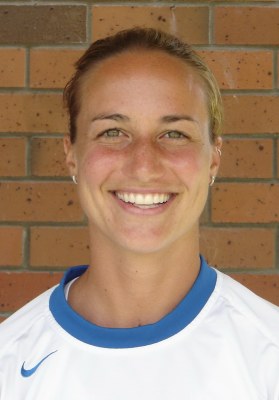 Rebecca Smith's Favourites
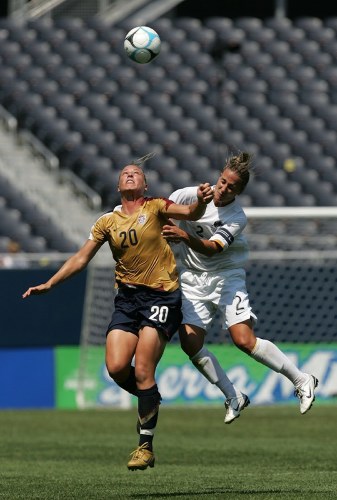 In aerial combat with the USA's Abby Wambach in Chicago on August 12
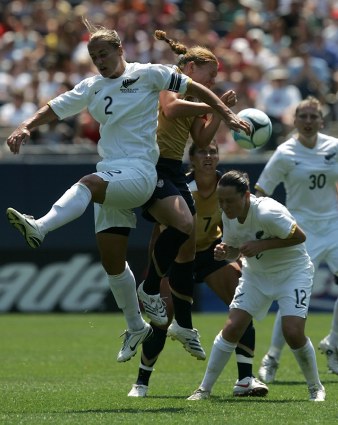 In aerial combat with the USA's Lori Chalupny in Chicago on August 12
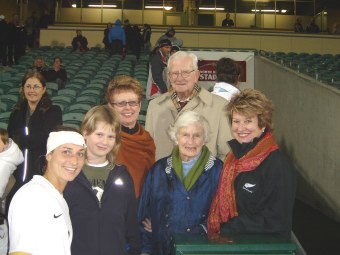 A proud family with New Zealand's captain, sporting the wounds of war after the second Canada clash
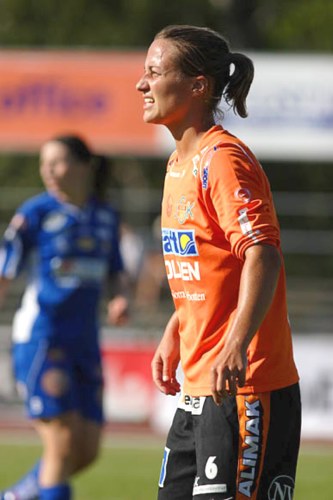 In action for Sunnana
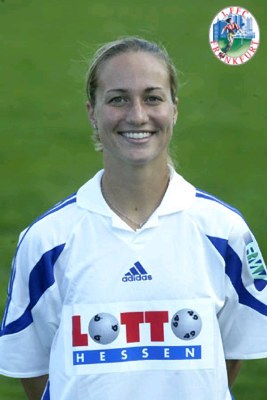 Sporting the colours of FSV Frankfurt
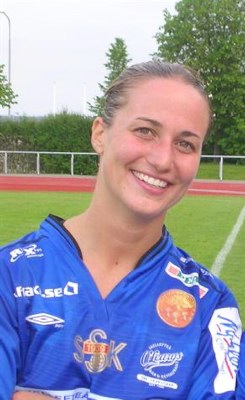 In Sunnana SK's advert-laden shirt
|
opportunities are definitely there for those who are good enough - the key is making the connections.
LIFE AT SUNNANA
In my case, I'm fully professional, and when I'm not training or playing, which is often, you'll find me either in the clubhouse working on marketing or sponsorship material, or doing some publicity work in town.
While in Europe, I've learnt to speak German and Swedish in my encounters, and Norwegian is similar to Swedish. However, I'm now keen to get back to working towards my Masters degree in business or law. Unfortunately there's nothing available locally.
A typical week during the season at Sunnana kicks off on a Monday afternoon, with a ninety-minute weight-training session from 4pm - some of us do extra conditioning running beforehand. We also do plyometrics, speed or agilities work in this time.
Tuesday sees two training sessions taking place, beginning with an hour-long one at 10am for individual training, which involves all the girls who aren't working or who are at school. Then we have a two-hour session at 5pm. We repeat this programme on Thursdays.
On Wednesdays, we just have the one session, between 5 and 7pm, but in the mornings I'll either go for a run or do some gym work. Friday sees another two-hour session, this time from 3.30pm, while Saturday is a rest day.
Sunday is normally game-day in the Damallsvenskan, although occasionally we have midweek fixtures - our first home game of the 2007 season is on Anzac Day, for instance. Because of our location, we fly to all our away games. Umea is our closest game - they're 109 km away, while Malmo is 1107 km away, the equivalent of Auckland to Invercargill.
If we're playing Malmo away, we'll travel on Friday or Saturday, and stay the weekend in the city. We tend to go on a pre-season tour as well. This year we spent a week in Turkey, training twice a day as well as having two games in the week - hard work, but fun also.
Should the Swedish national team have games, no league action is scheduled, but we'll still train as usual and play scrimmage games against a boys team.
I had a hard time deciding where to play this season as I had received offers from a couple of other clubs, specifically Hammarby IF, Gothenburg and Bayern Munich.
Playing on my mind was my desire to resume my education, and in all three cases, it would have been a little bit warmer, but not by much! Of the two Swedish teams, Gothenburg were the better option, as they have more national players (Finnish and Swedish) in their ranks, while the offer from Bayern Munich is self-explanatory, given their history in world football.
In the midst of all these considerations, Sunnana presented me with a great offer, and it was a contributing factor in my staying with them for the 2007 season. There were numerous others, however - the team only started gelling in the second half of last season, for instance, so we'll be looking to improve on our mid-table finish in 2006.
As well, it's a World Cup year, and given the demands that will entail, it would have meant too much upheaval and disruption in the year had I opted to switch clubs. So, as I'm settled at Sunnana, and really enjoy the environment around the team, I happily took up their offer.
NEW ZEALAND
Just as happily as I made the trip to join the New Zealand squad in Hangzhou, China, last November, for our first international since May 2005. That opportunity came as quite a surprise, since my season had just ended and I was training with Bayern Munich for the two weeks when I was contacted.
Given the late organisation of the tour, it could have held the potential for disaster, but I saw it as a great opportunity for some young players to get some serious experience and some senior players to enjoy another game opportunity.
It wasn't a huge success, `cause we didn't win the games (China prevailed by 3-0 and 4-0 scorelines), but if we'd scored …! Getting to meet and work with the new NZ coaches, Allan Jones and his successor, John Herdman, who is so organised and dedicated, was a plus, and you could tell the impact of that organisation and dedication on the pitch - the team really played as a team.
The China tour saw a number of the squad which played in last year's U-20 Women's World Cup Finals make their senior debuts, and that experience, plus the opportunity to work with that group and others at January's training camp, has left me absolutely excited by the talent here in New Zealand.
The investment by NZ Soccer in those players over the course of the year is already paying dividends. The national body is working hard to reduce the gap between ourselves and the leading women's soccer-playing nations, although they'll have to go some to match Germany - they've been planning for China `07 for three years!
While it has to be done in an organised, systematic manner, give us the opportunities which Germany, the USA and Sweden have had and we'll get those results!
The key difference between Sweden or the USA and New Zealand is the number of games they get to play and consistent training camps they have. The more games played, the more experience gained, etc., hence our youth players are now starting to play more games.
There's the mentality aspect, too. In Sweden, the national team players get paid. They only have to work 40% of the time - the rest is spent training, so they are very professional and very focused in their approach to football.
That situation comes about from success - Sweden were runners-up in the 2003 Women's World Cup, and were third in both the 2006 and 2007 Algarve Cup, which is the biggest international tournament in the women's game outside the World Cup, the Olympics and the European Championships.
Due to that success, they enjoy huge support from the Swedish Football Federation, who put more focus on the women's game than they do the men's code. An obvious example of their investment is the rate of the Damallsvenskan's development, because teams can afford to buy better players and improve their current ones.
The Swedish Olympic Committee tests every single player in the league three times - before, during and after the season, and puts every squad member through their paces - Cooper Test, yo-yos, jump tests, squats, bench presses, pull-ups … you name it, we do it!
A personal report is compiled for each player, and is given to both the individual and their club's Strength & Conditioning coaches. It makes for amazing feedback and has proven very beneficial.
GOALS
Hence in 2007, one of my personal goals is to be as physically fit as I can possibly be, in terms of power, strength, speed, agility, and mental fitness too.
Approaching the game with the right mentality is so important. In every Sunnana fixture this season, I intend to go into the game with the idea of playing as if it were an international match.
Our collective goal this season is to secure a top-five finish - our mentality is, “we're here to win and compete with the best teams in the world”. Last year we tended to play well and lose too often at Sunnana, hence the change of approach. I'd rather play badly and win than play well and lose any day of the week!!
As with Sunnana, so with New Zealand. I believe we're all aiming to get through our group at the World Cup Finals - it's 100% achievable, and a tangible goal for our country.
The key to this is the team's mentality, both individually and as a team. If we're prepared mentally and physically, we can achieve our objectives. When we play the likes of the USA and Germany, it's not about giving them good games, it's about beating them.
Qualifying for China realised one of my prime objectives for 2007 for New Zealand. We scored some goals in Papua New Guinea - me included! - and that has given us a real confidence boost. Now we need to be competitive. And we can be.
|